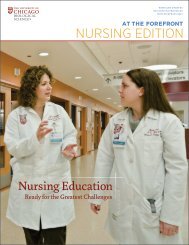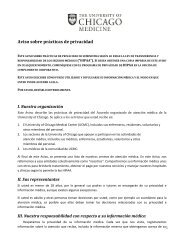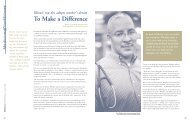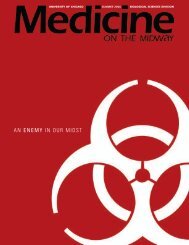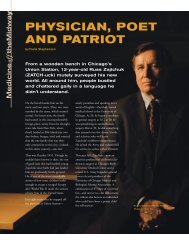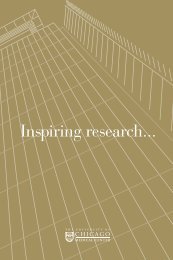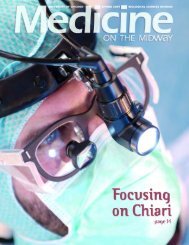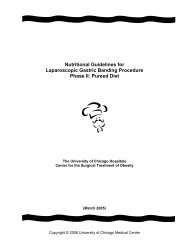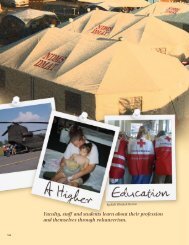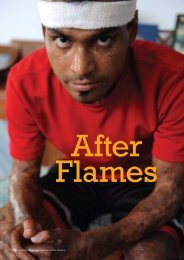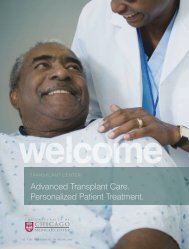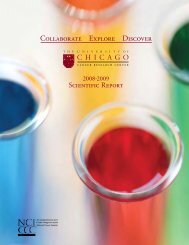Improving Urban Health (continued)Family physicianDionna Brown, MD,recently beganher second yearin the REACHprogram. Sheworks at theChicago FamilyHealth Centerin Pullman.HIGHLIGHTS <strong>OF</strong> <strong>THE</strong>URBAN HEALTH INITI<strong>AT</strong>IVESouth Side Healthcare CollaborativeUHI focuses on preventive care by connecting adults andchildren with affordable, experienced doctors in the SouthSide Healthcare Collaborative, a network of more than 30community health centers, two free clinics and five localhospitals. In addition to offering routine medical services,many of the community-based health centers in the networkprovide social support, behavioral health, nutrition, dentaland pharmacy services.The University of Chicago Medical Center has implementedExtension for Community Healthcare Outcomes (ECHO),a teaching tool that uses video conferencing to train staff at theseclinics. In 2011, the Medical Center created ECHO programson treating hypertension and attention deficit hyperactivitydisorder as well as managing care for breast cancer survivors.social, cultural and civic resources available in 34 SouthSide communities. By connecting residents with services intheir neighborhoods, the Asset Census Project aims to helpparticipants learn more about services that promote wellnessand find quality health resources close to home.Repayment for Education to Alumniin Community HealthIn 2008, the University of Chicago established Repaymentfor Education to Alumni in Community Health (REACH)to encourage and enable Pritzker School of Medicinegraduates to practice on the South Side. REACH providesup to four years of financial support to help young physiciansrepay medical school debt while also making an impact inthe neighborhood where they received their education. Thedoctors work in Federally Qualified Health Centers or incommunity hospitals in the medical campus’ primary servicearea. Some also conduct research on how to improve healthcare delivery to medically underserved areas.Pipeline Programs for High Schooland College StudentsThe Pritzker School of Medicine inspires and preparestalented high school and college students to pursue careersin medicine and health-related research through fourinnovative “pipeline” initiatives: the Chicago AcademicMedicine Program, Pritzker School of Medicine Experiencein Research, Young Scientists Training Program and TrainingEarly Achievers for Careers in Health. Largely designed toattract minorities who are underrepresented in the medicaland scientific fields, these programs encourage students toaim for high levels of achievement and, eventually, to practicein medically underserved communities.South Side Health and Vitality StudiesTo better understand community health issues, the MedicalCenter and the University of Chicago have partnered withcommunity-based organizations to create the South SideHealth and Vitality Studies. This research focuses on howsocial and environmental factors in the community affecthealth and influence attitudes toward medical services.Information gathered from this project guides UHI in thedevelopment of programs, services and policies.One key study under way is the Asset Census Project, acomprehensive survey mapping all commercial, health care,$1.6MILLIONINVESTEDfor the UrbanHealth Initiative12NEIGHBORHOODSMAPPEDas part of the AssetCensus ProjectFor fiscal year ended June 30, 20112,371PEOPLECONNECTEDto a community orspecialty care clinicthrough UHI50STUDENTSINVOLVEDin pipeline programs6University of Chicago Medicine
Visit one of these locations to find a primarycare doctor. For more information, contactthe South Side Healthcare Collaborativeat 773.702.5668 or visituchospitals.edu/medicalhome6 Chicago Family HealthCenter - South Chicago9119 S. Exchange Ave. | 773.768.5000Special Services: Behavioral Health,Dentistry, OB/GYN, Pediatrics,Nutritional, AllScripts7 Chicago Family HealthCenter - Roseland120 W. 111th St. | 773.768.5000Special Services: OB/GYN,Pediatrics, Behavioral Health8 Chicago Family HealthCenter - Pullman556 E. 115th St. | 773.768.5000Special Services: Pediatrics,Dentistry, OB/GYN, AllScripts,Behavioral Health9 Christian CommunityHealth Center9718 S. Halsted St. | 773.233.4100Special Services: Behavioral Health,Dentistry, HIV, OB/GYN,Pediatrics, Podiatry10 Christian CommunityHealth Center364 Torrence Ave., Calumet City708.868.9457Special Services: OB/GYN,Pediatrics11 Frank Bearden, M.D.2011 E. 75th St., Suite 102773.752.2483Special Services: Diabetes12 Friend Family Health Center5843 S. Western Ave. | 773-434-8600Special Services: Pediatrics,Internal Medicine13 Friend Family Health Center800 E. 55th St. | 773.702.0660Special Services: Pediatrics, FamilyMedicine, Internal Medicine, OB/GYN, Confidential Teen Care,Pediatric Infectious Disease14 Friend Family Health Center5635 S. Pulaski Rd. | 773.585.3900Special Services: Pediatrics, OB/GYN19 Cottage View HealthCenter - Near North4829 S. Cottage Grove Ave.773.548.1170Special Services: Nutrition, Sub-Specialty Services (as needed)20 ACCESS South State FamilyHealth Center5050 S. State St., 2nd Floor773.624.2700Special Services: Cardiology,OB/GYN, Obstetrics21 TCA Health, Inc.1029 E. 130th St. | 773.995.6300Special Services: Optometry, Dentistry,OB/GYN, Pediatrics, Psychiatry,Behavioral Health/Substance Abuse,Internal/Family Medicine22 Mile Square Health Centerat South Shore7131 S. Jeffrey Blvd. | 312.996.2000Special Services: Adult/PediatricDentistry, Family Medicine, OB/GYN23 Mercy Family Health Center2525 S. Michigan Ave. | 312.567.2000Special Services: OB/GYN, Pediatrics,Internal Medicine24 Friend Family HealthCenter - Beethoven25 W. 47th St. | 773.702.0660Special Services: Pediatrics, InternalMedicine25 Chicago Family HealthCenter - Chicago Lawn3223 W. 63rd St. | 773.768.5000Special Services: Pediatrics, BehavioralHealth, Dentistry, OB/GYN26 Friend Family Health Center2436 W. 47th St. | 773.376.9400Special Services: Family Medicine,OB/GYN27 Chicago Family HealthCenter - East Side10536 S. Ewing Ave. | 773.768.5000Special Services: OB/GYN,Behavioral Health, Dentistry1 ACCESS Ashland FamilyHealth Center5256 S. Ashland Ave. | 773.434.92162 ACCESS Auburn-GreshamFamily Health Center8234 S. Ashland Ave. | 773.874.1400Special Services: Pediatrics,OB/GYN, Family Medicine3 Beloved CommunityFamily Wellness Center6821 S. Halsted St. | 773.651.36294 ACCESS Booker FamilyHealth Center654 E. 47th St. | 773.624.4800Special Services: Internal Medicine,OB/GYN, Family Medicine5 ACCESS Brandon FamilyHealth Center8300 S. Brandon Ave. | 773.721.7600Special Services: Family Medicine,OB/GYN, Asthma15 ACCESS Grand BoulevardFamily Health Center5401 S. Wentworth Ave.773.288.6900Special Services: Infection Control,Adult Rheumatology, Adult/Pediatric Cardiology, Adult/Pediatric Endocrinology, Adult/Pediatric Gastroenterology,Pediatric Neurology16 ACCESS at IllinoisEye Institute3241 S. Michigan Ave. | 312.949.777017 Komed Holman HealthCenter - Near North4259 S. Berkeley Ave. | 773.268.7600Special Services: Internal Medicine,Pediatric Medicine, Women’s Health,Ophthalmology, Oral Health,Podiatry18 Mile Square Health Centerat Bishop Plaza4630 S. Bishop Plz. | 312.996.2000Special Services: Family Medicine,OB/GYN, Eye Care28 Christian CommunityHealth Center901 E. Sibley Blvd., South Holland773.233.4100Special Services: Pediatrics29 CommunityHealth641 W. 63rd St. | 773.994.151530 ACCESS at Holy Cross2701 W. 68th St., 3-South773.434.4040Special Services: Behavioral Health,Family Medicine, OB/GYN,Pediatrics31 IMAN Health Clinic2744 W. 63rd St. | 773.434.4626Special Services: Family Medicine,Pediatrics32 Senior Health Center atSouth Shore7101 S. Exchange Ave. | 773.702.5700Special Services: Consultationsin Memory Center Assessment,Successful Aging for Frail Elders(SAFE) Clinic7



